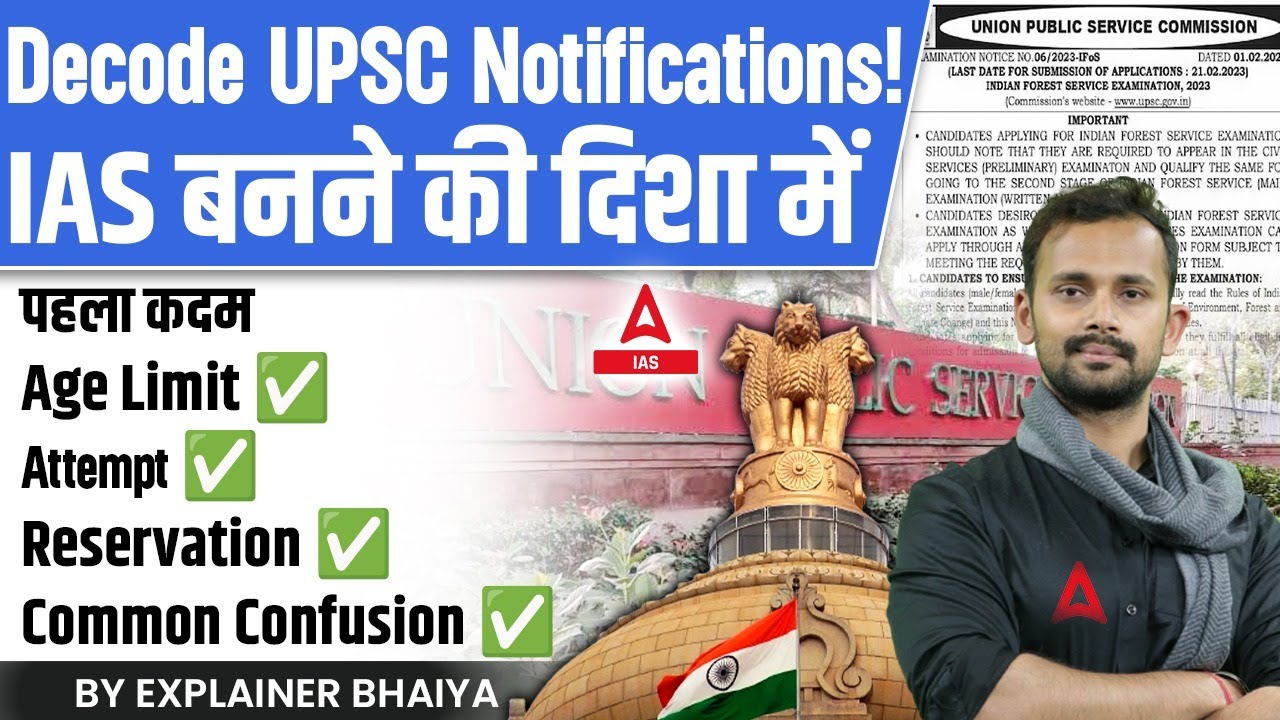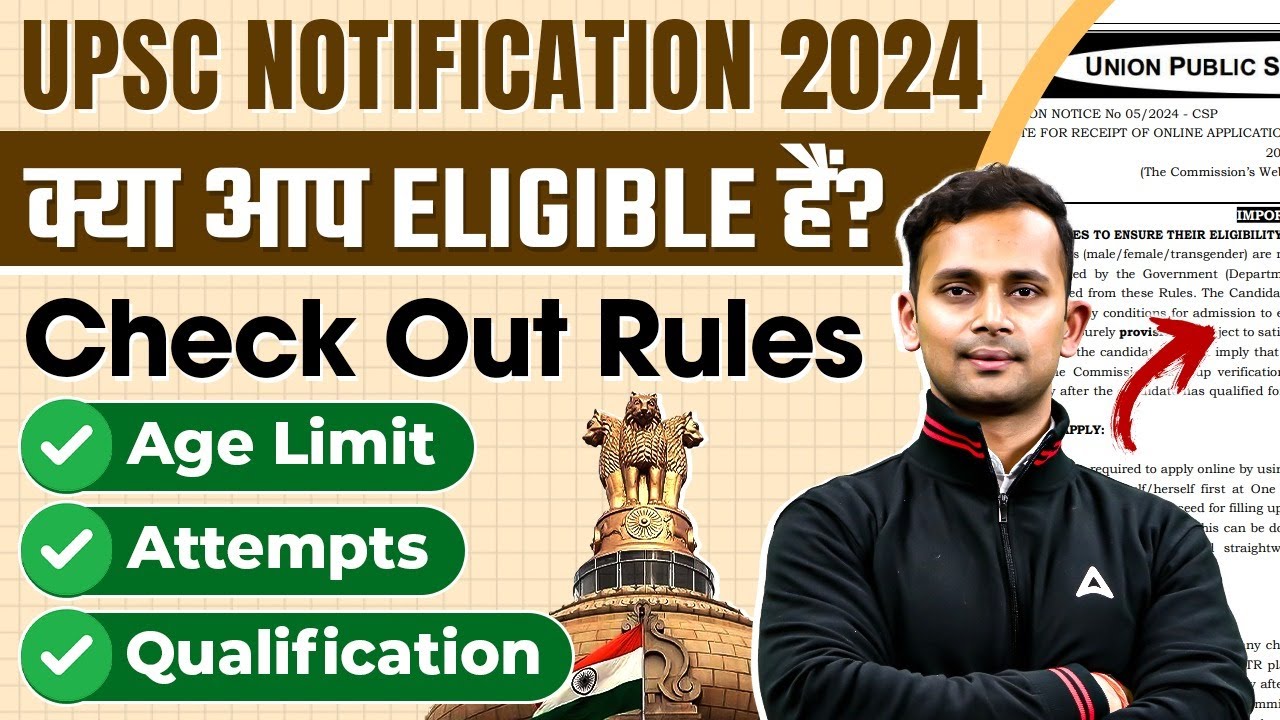
The Union Public Service Commission (UPSC) is the apex body responsible for conducting the Civil Services Exam in India. Being one of the highest level competitive exams in the country, there are various doubts and queries that an aspirant has with regard to the IAS examination recruitment process.
To assist candidates, especially beginners, we bring to you a compilation of Frequently Asked Questions on IAS. These UPSC FAQ are in context with all the relevant information regarding eligibility, application, exam pattern, scheme of selection, and other recruitment details, which will help applicants understand the examination process even better.

Table of Contents:
Frequently Asked Questions on UPSC IAS
Q1. What is the full form of UPSC?
Ans. UPSC stands for Union Public Service Commission.
Q2. What is IAS?
Ans. IAS stands for Indian Administrative Service. It is the administrative arm of the All India Services of the Government of India.
Q3. What is the job profile of an IAS Officer?
Ans. The Indian Administrative Service (IAS) is a highly prestigious career option. The IAS officer performs a number of varied tasks, which mostly involve administrative charge of a district/area/department, policy formulation, policy implementation, heading PSUs, etc.
Q4. What is the civil services examination?
Ans. Civil Services Examination is conducted for the recruitment at Indian Administrative Service (IAS), Indian Foreign Service (IFS), Indian Police Service (IPS), and other Central Services and posts in accordance with the Rules published by the Government.
Q5. What is AIS?
Ans. AIS stands for All India Services. It comprises the three prestigious civil services of India: the Indian Administrative Service (IAS); the Indian Police Service (IPS); and the Indian Forest Service (IFS).
Q6. How does one become an IAS officer?
Ans. To become an IAS officer, you must clear the Civil Services Examination conducted by UPSC. The process includes preliminary exams, main exams, and a personal interview.
UPSC FAQ on Recruitment & Notification
Q1. When is the exam notification released?
Ans. The exam notification is typically released by the Union Public Service Commission (UPSC) in the month of February every year, which includes the exam dates, eligibility criteria, and other important details.
Q2. How many attempts are allowed for the UPSC exam?
Ans. General category candidates can attempt the UPSC Civil Services Exam up to 6 times. The number of attempts varies for other categories, such as 9 attempts for OBC candidates and unlimited attempts for SC/ST candidates.
Q3. What is the age limit for appearing in the UPSC exam?
Ans. The age limit for General category candidates is between 21 and 32 years. Age relaxation is provided for other categories, such as up to 35 years for OBC candidates and up to 37 years for SC/ST candidates.
Q4. How often is the UPSC Civil Services Examination conducted?
Ans. The UPSC Civil Services Examination is conducted annually. The examination typically includes three stages: Preliminary, Mains, and Interview, held throughout the year.
Q5. What are the main sections in the UPSC notification?
Ans. The main sections in the UPSC notification include the examination schedule, eligibility criteria, application procedure, syllabus for Preliminary and Main exams, and details about the interview process.
Q6. Where can I find the official UPSC notification?
Ans. The official UPSC notification can be found on the UPSC's official website [www.upsc.gov.in](https://www.upsc.gov.in). It is also published in major newspapers and employment news.

UPSC FAQ on Online Registration & Application Process
Q1. How do I register for the UPSC Civil Services Exam?
Ans. To register for the UPSC Civil Services Exam, you need to visit the UPSC online application portal at [upsconline.nic.in](https://upsconline.nic.in). Fill out the application form, upload necessary documents, and pay the application fee.
Q2. What is the application fee for the UPSC Civil Services Exam?
Ans. The application fee for the UPSC Civil Services Exam is Rs. 100 for General and OBC candidates. SC/ST candidates, as well as female candidates, are exempt from paying the fee.
Q3. Can I edit my UPSC application form after submission?
Ans. Yes, you can make corrections to your UPSC application form during the correction window provided by UPSC, which is typically available for a few days after the submission deadline.
Q4. What documents are required for the UPSC application?
Ans. Required documents for the UPSC application include a scanned photograph, signature, and, in some cases, documents proving educational qualifications and category certificates.
Q5. How can I track the status of my UPSC application?
Ans. You can track the status of your UPSC application by logging into the UPSC online application portal and checking the status under your profile section.
Q6. When is the last date to apply for the UPSC Civil Services Exam?
Ans. The last date to apply for the UPSC Civil Services Exam is usually in March. Exact dates are provided in the UPSC notification each year.
UPSC FAQ on Eligibility Criteria
Q1. What are the educational qualifications required for the UPSC Civil Services Exam?
Ans. Candidates must have a Bachelor's degree from a recognized university or institution. There is no specific requirement for the stream of education.
Q2. Are there any age relaxations for different categories?
Ans. Yes, age relaxations are provided for various categories. For instance, OBC candidates get a 3-year relaxation, SC/ST candidates get a 5-year relaxation, and there are specific relaxations for other categories as well.
Q3. Is there any physical fitness requirement for the UPSC Civil Services Exam?
Ans. There is no physical fitness requirement for the UPSC Civil Services Exam itself, but candidates should meet the physical standards required for the specific service they are selected for, such as the Indian Police Service (IPS).
Q4. Can final-year students apply for the UPSC Civil Services Exam?
Ans. Yes, final-year students can apply for the exam, but they must provide proof of their passing the examination at the time of the Mains exam or interview.
Q5. What are the nationality requirements for the UPSC Civil Services Exam?
Ans. The candidate must be a citizen of India. Certain other nationals are also eligible, including those from Nepal, Bhutan, and some refugees who have settled in India.
Q6. Can a person with a disability apply for the UPSC Civil Services Exam?
Ans. Yes, candidates with disabilities can apply for the UPSC Civil Services Exam and are given certain concessions, including extra time and provisions for assistive devices during the examination.
 Know More
Know More
UPSC FAQ on Admit Card/Call Letter
Q1. How can I download my UPSC admit card?
Ans. The admit card can be downloaded from the UPSC official website. You need to log in with your registration details to access and download the admit card.
Q2. When is the admit card released?
Ans. The admit card is usually released about 3-4 weeks before the examination date. Exact dates are announced in the UPSC notification.
Q3. What should I do if there is an error on my admit card?
Ans. If there is an error on your admit card, you should immediately contact the UPSC helpline or support to get the issue resolved before the exam.
Q4. Can I receive my admit card by post?
Ans. No, the admit card is only available for download online. Candidates are not sent physical copies of the admit card by post.
Q5. What documents should I carry to the examination center along with the admit card?
Ans. Along with the admit card, you should carry a valid photo ID proof (such as Aadhar card, passport, or driving license) and a passport-sized photograph as specified in the instructions.
Q6. What should I do if I forget to bring my admit card on the exam day?
Ans. If you forget to bring your admit card, you may not be allowed to sit for the exam. It is crucial to ensure that you carry your admit card and all required documents to the examination center.
UPSC FAQ on Syllabus & Exam Pattern
Q1. What is the pattern of the UPSC Civil Services Examination?
Ans. The UPSC Civil Services Examination consists of three stages: Preliminary Examination (Objective type), Main Examination (Descriptive type), and Personality Test (Interview).
Q2. What subjects are covered in the Preliminary Examination?
Ans. The Preliminary Examination includes two papers: General Studies Paper I and General Studies Paper II (CSAT). General Studies Paper I covers current events, history, geography, and more, while Paper II is a qualifying paper focused on aptitude skills.
Q3. How many papers are there in the Main Examination?
Ans. The Main Examination consists of 9 papers, which include two qualifying papers (Language Papers) and seven papers on general studies and optional subjects, including an Essay paper.
Q4. What is the marking scheme for the UPSC Civil Services Exam?
Ans. The marking scheme includes negative marking for incorrect answers in the Preliminary Examination. The Main Examination is evaluated based on a descriptive format, and the interview is conducted to assess candidates' suitability for the service.
Q5. Where can I find the detailed syllabus for the UPSC Civil Services Examination?
Ans. The detailed syllabus for the UPSC Civil Services Examination is available on the UPSC official website under the "Examinations" section. It is also included in the exam notification.
Q6. How can I prepare for the optional subject in the Main Examination?
Ans. To prepare for the optional subject, you should thoroughly review the syllabus, study standard textbooks, and refer to previous years' question papers. Coaching classes and online resources can also be helpful.
UPSC FAQ on Exam Preparation
Q1. What are the best resources for preparing for the UPSC Civil Services Exam?
Ans. Some of the best resources include NCERT textbooks, standard reference books for general studies and optional subjects, previous years' question papers, and current affairs magazines. Online courses and coaching centers can also be beneficial.
Q2. How many hours should I study daily for the UPSC Civil Services Exam?
Ans. The number of hours required for daily study varies from person to person. On average, 6-8 hours of focused study daily is recommended, with breaks and time for revision included.
Q3. How can I manage my time effectively during the preparation period?
Ans. Effective time management involves creating a structured study plan, setting realistic goals, prioritizing tasks, and sticking to a schedule. Regular revision and practice tests are also crucial.
Q4. Should I join a coaching institute for UPSC preparation?
Ans. Joining a coaching institute is optional. It can be helpful if you need structured guidance and support, but many candidates successfully prepare using self-study methods and online resources.
Q5. How important is it to stay updated with current affairs?
Ans. Staying updated with current affairs is crucial for the UPSC Civil Services Exam, especially for the General Studies papers and Interview. Regular reading of newspapers, magazines, and online news sources is recommended.
Q6. What should be my strategy for the Interview stage?
Ans. For the Interview stage, focus on improving your communication skills, personality development, and knowledge about current events and general awareness. Mock interviews and feedback from mentors can also be helpful.